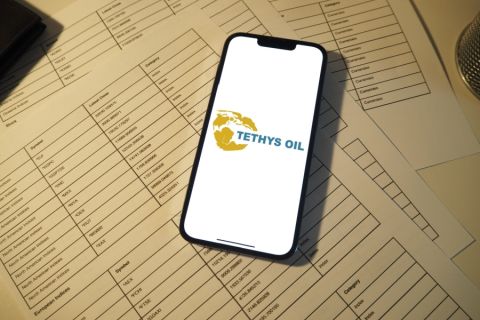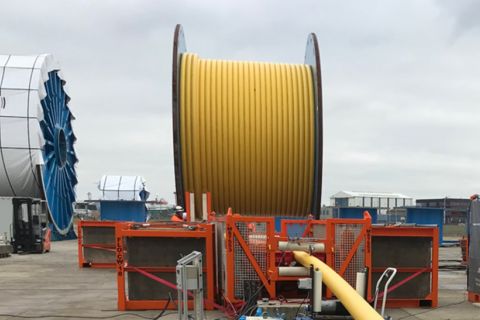
LR’s VR Safety Simulator utilizes the latest high-powered computing to simulate real-life situations with a high degree of interactivity for the user. (Source: Lloyd’s Register)
Rapid developments in technology, the digital economy and the convergence of physical and cyber are transforming the way humans live and work and are creating enormous opportunities and challenges for society and business.
Lloyd’s Register (LR) works to understand the transformative impact the Internet of Things (IoT), data analytics, remote sensing and disruptive technologies are having on business and the way people work. Through the company’s existing software, services and digital innovation strategic focus areas, which include masters of risk, connected assets and super surveyor, LR delivers business efficiency and increased performance without compromising safety.

The company’s Virtual Reality (VR) Safety Simulator, released in May 2017, is designed to help support training and knowledge transfer in the energy industry. Through the application of the latest VR technology advancements, which include augmented reality add-on modules, LR has built a virtual environment to help illustrate the need for a continued focus on safety and risk assessments in the industry.
Society has witnessed the transformative nature that digital technology has accomplished. Digital innovation has permeated sectors such as retail, finance and consumer technologies, but its full potential in deep industrial sectors has yet to be realized. Although the safety and risk market is significant, it is still relatively untapped by digital technology companies.
There are huge opportunities for the oil and gas industry to innovate new technologies to enhance safety in its operations. So why has adoption in the industry been relatively slow?
Digital technologies, from the early computers of the 1950s to the internet-equipped smartphones of the 21st century, have fundamentally changed the way industries function and have opened the way to trillion-dollar industries such as internet infrastructure, enterprise software, mobiles, online retail, gaming and apps—resulting in the world exploding into the Digital Revolution.
These technologies have emerged incrementally and to varying degrees and speeds across industrial sectors, growing hand in hand with increased levels of IT and automation. It is only recently that industry executives and analysts have begun talking about another revolution in which digitalization is taking over the industry, which has been dubbed the fourth Industrial Revolution, or Industry 4.0.
What makes Industry 4.0 different is the prospect of a new level of digital interconnectedness and integration between firms, supply chains, production, products, customer and end-use applications. This offers the prospect of generating the same dynamics the industry has seen in the evolution of the internet, which is why phrases such as “Industrial Internet” or “IoT” are often used to describe this new wave of transformation.
Several transformational digital technologies are contributing to realize possibilities in the industry, such as cheap sensing and pervasive wireless connectivity; the ability to capture, store and perform sophisticated analytics of vast quantities of data; the internet and cloud; robotics and autonomy; blockchain; and additive manufacturing.
Adoption of new technology is rarely driven by curiosity. For many organizations the imperatives are to keep increasing efficiency and revenues, and suppliers and customers expect a company to have digital interfaces implemented into their operations. However, digital technologies also have the capability to fundamentally reduce risk and improve safety.
In this rapidly changing landscape, and faced with these imperatives, companies in industrial sectors need to relearn how to innovate faster and better. While R&D still needs as strong a role as ever, market-facing innovation in the digital era requires companies to adopt an agile innovation culture driven by pilots, rapid iterations driven by customer feedback loops and an open innovation, collaborative mindset to partner with best-in-class technology providers.
Knocking down barriers
However, adoption of cutting-edge digital technologies to reduce risk and improve safety in industries is a long journey with many barriers. Regulatory, financial and cultural barriers cannot easily be overcome at the initial uncertain, but essential, stages of piloting and evaluating new technology. As a result, technology companies themselves are struggling to refine their products, gain visibility of the market potential and find a route to market—creating a vicious circle.
LR’s Safety Accelerator, funded by U.K. charity Lloyd’s Register Foundation, is a new initiative designed to help remove the key barriers preventing industry uptake of cutting-edge safety and risk technologies and solutions as well as create a “safety tech” market for technology providers.
The program will work with key industry players to identify areas of operation with the most significant challenges to safety and risk that can be addressed with cutting-edge data and digital solutions, including those that have been validated in other sectors. Small technology businesses seeking an application for emerging or existing digital solutions will be invited to apply for funding to trial these products in an industrial environment through the accelerator collaborators.
By providing the opportunity for industry partners and small innovative businesses to de-risk their initial engagement in the evaluation of the technologies, the Safety Accelerator will address issues acting as a barrier to improved industrial operation. Industry partners engaging with the Safety Accelerator also will get the opportunity to engage with a global community of cutting-edge small innovative firms and startups, specifically selected as having the potential to address their key safety challenges.
At the same time, the Safety Accelerator will support small innovative businesses through offering the ability to trial solutions in the real world with a leading industry player. The program will also fund the trial, industry-specific specialist support and training (e.g., regulator, data and systems) from LR and its clients, and entrepreneur development (e.g., marketing, IP, minimum viable product, business case and investor pitching). The program provides opportunities for all types of digital technology solutions, especially those that support data-driven innovation.
The Lloyd’s Register Foundation brings a deep understanding of safety and risks and global industry challenges. The Foundation aims to constantly research safety and risk issues and will provide input for challenges or themes for the Safety Accelerator program in the form of published research, such as an insight report on global safety challenges. “Human safety onboard” has been selected as the first safety challenge theme for the program, and applications addressing this challenge area are scheduled to open this summer.
Have a story idea for Industry Pulse? This feature looks into big-picture trends that are likely to affect the upstream oil and gas industry. Submit story ideas to Group Managing Editor Jo Ann Davy at jdavy@hartenergy.com.
Recommended Reading
Santos’ Pikka Phase 1 in Alaska to Deliver First Oil by 2026
2024-04-18 - Australia's Santos expects first oil to flow from the 80,000 bbl/d Pikka Phase 1 project in Alaska by 2026, diversifying Santos' portfolio and reducing geographic concentration risk.
Iraq to Seek Bids for Oil, Gas Contracts April 27
2024-04-18 - Iraq will auction 30 new oil and gas projects in two licensing rounds distributed across the country.
Vår Energi Hits Oil with Ringhorne North
2024-04-17 - Vår Energi’s North Sea discovery de-risks drilling prospects in the area and could be tied back to Balder area infrastructure.
Tethys Oil Releases March Production Results
2024-04-17 - Tethys Oil said the official selling price of its Oman Export Blend oil was $78.75/bbl.
Exxon Mobil Guyana Awards Two Contracts for its Whiptail Project
2024-04-16 - Exxon Mobil Guyana awarded Strohm and TechnipFMC with contracts for its Whiptail Project located offshore in Guyana’s Stabroek Block.




